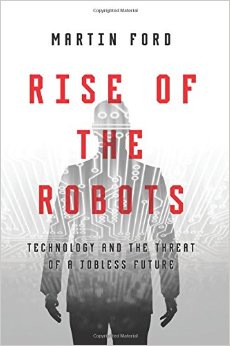05/29/2015

I just got my copy of Rise of the Robots: Technology and the Threat of a Jobless Future delivered from Amazon (famous for its Kiva automated warehouses), and the package definitely looked machine-friendly. It was not an envelope, but two pieces of lightweight cardboard pressed together. So presumably the book about robots taking human jobs was packaged by a robot.
The author of the book spoke at the San Francisco Commonwealth Club on Wednesday:
Rise of the RobotsYou can listen to the audio here, or at the Commonwealth link above. The whole event lasted around an hour, with a thirty-minute talk to start and then Q&A for the remainder. I didn’t find the question segment to be that interesting, but the talk itself is worth a listen.Wed, May 27 2015 — 6:00pm Martin Ford, Author; Software Developer; Computer Designer: Artificial intelligence is already well on its way to making “good jobs” obsolete: many paralegals, physicians and even — ironically — computer programmers are poised to be replaced by robots. As technology continues to develop, more and more traditional jobs will be shed. Unless we radically reassess our economic and political systems, some fear that this transition to extreme automation could result in massive unemployment, stark inequality and the implosion of the economy itself. Martin Ford, a successful Silicon Valley entrepreneur, offers both a vision of this new technology and a call to arms to face its implications, made more potent by Ford’s own integral role in creating the automated future he describes. His warning rings clearly: robots are coming, and we must decide now what course our future will take.
Ford started out directly with the central theme of his book, that robots and automation are going to cause an enormous disruption in society by making many jobs obsolete. He cited the Oxford University study of 2013 (The Future of Employment) that forecast around half of occupations in the United States could be lost to automation with in 20 years. The effect of that on society would be “dramatic” he thought. The point of the book is to initiate a conversation about the critical issue of the automated future.
He talked some about his own experience of starting a Silicon Valley software business in the early 1990s which was then a labor-intensive process including physically shipping out the software. As his business grew, he outsourced the shipping to some workers in Berkeley. But in a short time, “most of that work just evaporated.” Now most software is delivered over the internet or hosted in the cloud. So there were rapid changes in Ford’s business because of expanding technology where jobs just disappeared because of the changes in how things were done. He also saw similar disruptions in the music business and elsewhere, and began to understand these changes as a preview of what would happen more widely in the entire economy.
He then wrote a book The Lights in the Tunnel about the challenging economy of the future which he had to self-publish in 2009 because publishing houses thought the subject was unimportant, even on the fringe. But now, a few years later, he could publish in the traditional fashion because the public is more ready to hear the message.
The question he hears more than any other is why would this time be any different compared with historical transformations of labor starting 200 years ago with the Luddite revolt. As a technologist, Ford believes that machines can evolve to do many of the tasks of production now done by humans. There have been instances of rapid change in history where people had no idea what was coming, one being powered flight. Before the Wright brothers, few thought heavier-than-air contraptions could be built, much less turned into a major mode of transportation that has changed the world, and done so very rapidly.
Conventional assumptions about job loss are wrong, particularly the idea that retraining workers is the answer: clearly it isn’t when there are no jobs to train for. Furthermore, some white collar jobs are easier to replace because only software is required, not an entire robot.
The crisis of job loss is not merely an individual problem; the economy depends on consumers to work. Plus, a healthy market with active consumers is required for innovation to be rewarded and new products to be invented.
Ford emphasized that the technology of automation will move forward whether we like it or not. But reaction to it will determine whether society has even more economic inequality and social conflict. Ford believes the extremity of the robot future requires something like a basic guaranteed income. So he is right about a larger conversation being needed.
This is a content archive of VDARE.com, which Letitia James forced off of the Internet using lawfare.